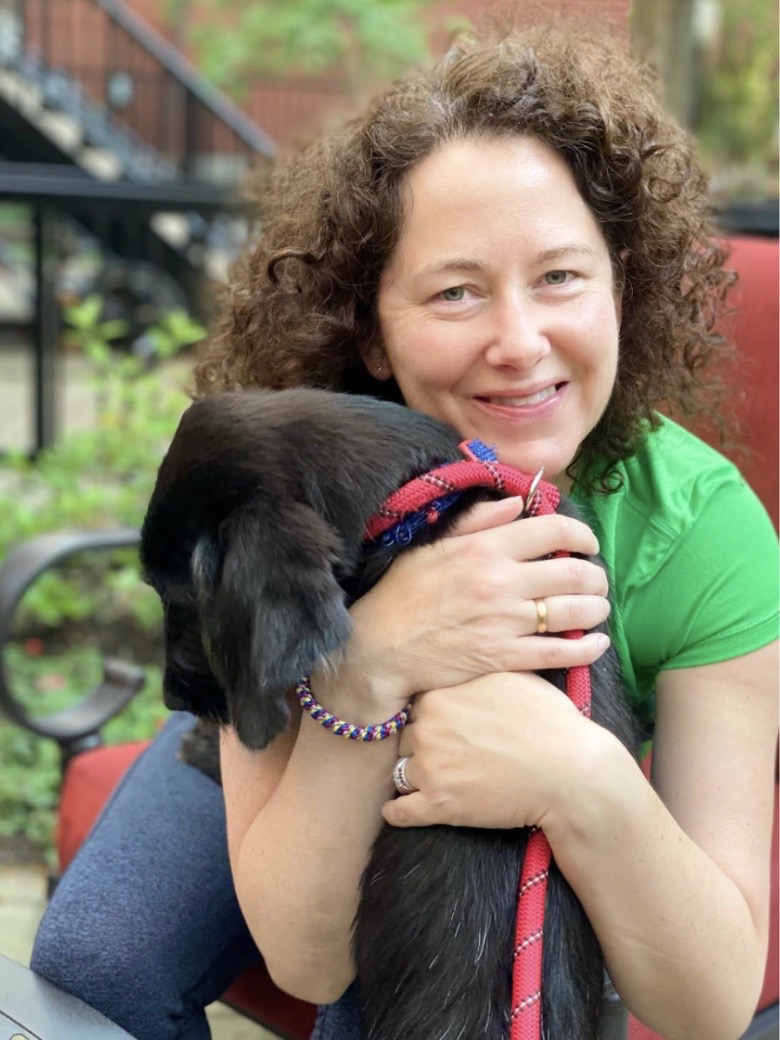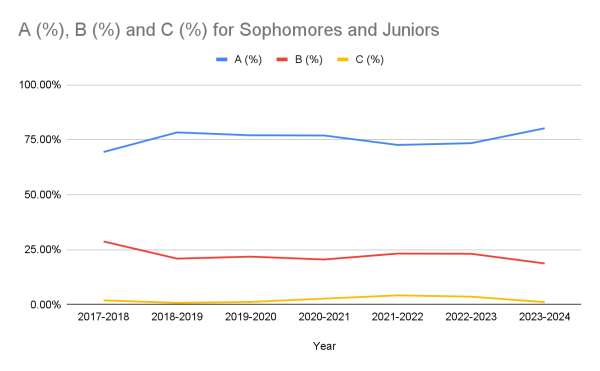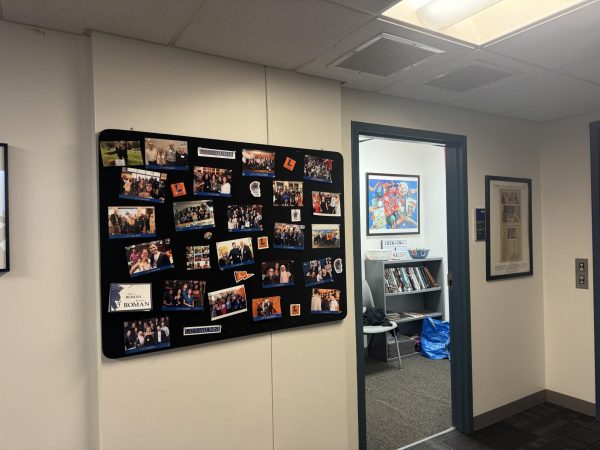Meet Latin’s Beloved, Buzzing Biology Teacher
Geraldine Schmadeke
Upper School biology teacher Geraldine Schmadeke has lived many lives, the most recent being here at Latin—with her students and her flies.
As students hover over bacterial plates, a sea of light blue latex gloves fills the identical black lab tables in the Upper School Science Center. Translucent pipettes fill with a mysterious liquid. Muffled voices fill the lab as students read directions aloud over and over again, and US biology teacher Geraldine Schmadeke observes. She gives small pointers and tips as needed, bouncing back and forth between the groups to watch the experiment unfold.
Ms. Schmadeke strides over to her next class of six seniors preparing microscopes and vials of fruit flies while the students walk in and prepare to examine the flies’ characteristics. Under the microscope lie minuscule insects—small, delicate wings, red and black eyes, fragile bodies. Again, she strolls up and down the room observing as her students investigate, research, and learn.
Latin’s beloved biology teacher Ms. Schmadeke has left a mark on many students. Having been at Latin for over a decade, she has contributed in many ways to the community, including initiating new science courses and being a reliable, hard-working teacher students look up to.
“She’s a great teacher,” senior Nathan Koo, who has been Ms. Schmadeke’s student for two consecutive years, said. “[She’s] sympathetic, interesting, and knowledgeable.”
“She takes the time, even outside of class, to make sure you understand the material and succeed,” junior and Honors Biology student Roya Smith said. “I feel like she just really cares a lot about her students.”
Reese Benford, a senior and Honors Advanced Biology student, said, “Ms. Schmadeke is just really dedicated to her work and the well-being of her students. Whenever I have a question and need to meet with her, she always takes the time to make sure she can answer my questions and check in on me while also really challenging me to be the best student.”
Born in Kilkenny, Ireland, Ms. Schmadeke grew up as the youngest of five children on a dairy farm in the southeast part of the country, where she lived and went to school for the first part of her life. She attended the University of College Cork, Ireland, where she earned both her bachelor’s and master’s degrees before moving to the United States.
“High school in Ireland is very much geared towards taking big tests, and so you would take six or seven subjects and you will have a big three-hour exam at the end of your senior year in each of those subjects,” Ms. Schmadeke said.
Ms. Schmadeke moved to Chicago in the spring of 2002 and began teaching at The Willows Academy, an all-girls school in the suburbs of Chicago around 2003. She worked there for two years before taking some time off and then coming to Latin in 2007.
She started her Latin career teaching freshman biology and AP Biology. “I really liked the idea of a smaller school, smaller classes,” Ms. Schmadeke said. “What I really loved when I got here was the Science Department, and I continue to just really find a home in the department even as teachers have come and gone.”
“There’s just something, I think it must be about science teachers. We’re just a little quirky, fun, and interesting.”
Ms. Schmadeke now teaches Honors Biology for juniors and Honors Advanced Biology for seniors. However, in the past two years, she began offering a new elective for seniors: Honors Research in Molecular Genetics (also known as the FLY-SP).
The class collaborates with a lab at Stanford that provides fruit flies for students to use to develop their own strains of new flies. The class spends most of their time in the lab, examining the flies under microscopes and using carbon dioxide to sedate the flies while conducting research and experiments.
“The goal through the year is to try and move an element of genetically modified DNA to a part of DNA that corresponds to a specific protein, and once [they] do that [their] goal is to get a bunch of flies that all have the same genes and send it back to Stanford’s lab,” senior Zoe Larsen, a student in the Molecular Genetics class, said.
She added, “[Scientists] can use our flies to basically ‘turn off and on’ the genetically modified Stanford gene which will inhibit or promote the attached protein so they can use our flies to learn more about the body and proteins.”
And Zoe isn’t the only person who enjoys the course—the fruit fly class is Ms. Schmadeke’s favorite to teach. “It’s a really great opportunity for the kids to focus on one small project and think about science and think about observations that they’re making and data that they’re collecting for a bigger purpose.”
“[Students are] generating tools for scientists to use,” Ms. Schmadeke said, “so the idea that that project is creating fruit flies essentially that can be used by scientists around the world is exciting.”
Ms. Schmadeke’s dedication to educating Latin students became apparent as she recalled a story of her time as a teacher during the COVID pandemic.
“I was one of the people who came into school and I hated Zoom teaching,” she said. “I just tried my best but hated it. I felt like I needed something else to engage my brain.” This eagerness to learn led her to conduct the fly lab by herself, which she later introduced to students.
When the entire school had shut down and all faculty, staff, and students were unable to come to campus, Ms. Schmadeke found herself ensnared in a tedious experiment that required specific lab equipment, and of course, the newly acquired vial of flies.
“I was right in the middle of a critical part of the project by myself, and so I took home a small can of CO2, and my flies, and a microscope, and I finished the project in my basement.” Ms. Schmadeke added, “[This class] I think is also another reason why I stay at the school. I thought it was a pretty neat opportunity and jumped on it, and the school supported it.”
She said, “At the end of the day, there’s just a sense of ‘I enjoy being here as a student and I want to learn,’ and I really enjoy that.”

























































Zach McArthur • Nov 16, 2023 at 7:23 am
Ah, great spotlight on the best!